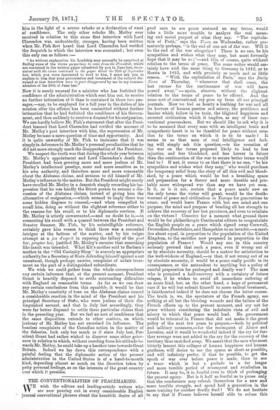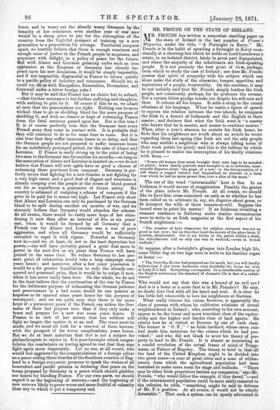THE CONVENTIONALITIES OF PEACEMAKING.
WE wish the editors and leading-article writers who are now pouring out in every considerable English journal conventional phrases about the heartfelt desire of all good men to see peace restored on any terms, would take a little more trouble to analyze the real mean- ing and moral purport of what they say. "The capitula- tion of Paris," says the Times on Wednesday, rather pre- maturely perhaps, " is the end of one act of the war. Will it be the end of the war altogether? There is no one, be his sympathies and wishes what they may, but must fervently hope that it may be so ;"—and this, of course, quite without relation to the terms of peace. The same writer w'ould cer- tainly have said the same thing to Germany in 1812, or to Russia in 1813, and with precisely as much and as little reason. "With the capitulation of Paris," says the Daily News of Thursday, "whenever that shall come, the last excuse for the continuance of war will have passed away," — again, observe, without the slightest relation to the terms of peace to be offered. And the same sort of conventional cry goes up from all our principal journals. Now we feel as hearty a loathing for war and all its horrors of human passion and misery, the pestilence and Tamine which follow in its train, the blighted happiness and arrested civilization which it implies, as any of these con- ventional peacemakers. But we should like to ask why it is to be assumed that every man with an intelligent brain and sympathetic heart is to be thankful for peace without rela- tion to the terms on which it is to be made It seeins to us that men of real intelligence and feel- ing will simply ask this question.—is the cessation of the war on the terms proposed likely to lead to less injustice, and less bloodshed, and less horror in future than the continuation of the war to secure better terms would lead to ? If not, it seems to us that there is no one, "be his sympathies and wishes what they may," who would purchase the temporary relief from the story of all this evil and blood- shed, by a peace which would be but a breathing space and preparation for a fiercer and more durable and pro- bably more widespread war than any we have yet seen. Is it, or is it not, certain that a peace made now on the only terms the victor will grant, would be the death- warrant of peace and civilization in Europe for generations to come, and would leave France with but one mind and one purpose, the mind and purpose of bending all her strength to achieve the recovery of her lost provinces, and even to retaliate on the victors Conceive for a moment what ground there would be for philanthropic Continental editors to congratulate the English people on a peace which signed away Cornwall, Devonshire, Dorsetshire, and Hampshire to an invader,—a sacri- fice about equal, in proportion to the population of the United Kingdom, to the sacrifice now proposed in proportion to the population of France ? Would any one in this country seriously pretend that such a peace, even if wrung out of us by absolute necessity, should be a matter for satisfaction to the well-wishers of England,—or that, if not wrung out of us by absolute necessity, it would be a peace really pacific in its consequences, or the antecedent to anything but a policy of careful preparation for prolonged and deadly war? The man who is promised a half-recovery with a certainty of future relapse, if he wishes to avoid all immediate suffering of an acute kind, but, on the other hand, a hope of permanent cure if he will but submit himself to more radical treatment, is fainthearted indeed if he does not choose the latter course. The truth is, we, the spectators of the French agony, see• nothing at all but the bleeding wounds and the failure of the French efforts up to the present moment, and cry out for peace without considering the indefinite vista of evil and misery to which that peace would lead. No government would be tolerated in France that did not make it the great policy of the next few years to prepare,—both by political and military measures,—for the reconquest of Alsace and Lorraine, and it would be wonderful indeed if the cry for fur- ther revenge were not added to the cry for the recovery of the territory thus snatched away. We assert that the men who most bitterly lament this collapse of human happiness and human goodness, will desire to see the spasm as short as possible, and will infinitely prefer, if that be possible, to get the epoch of war over before peace is made, than to see a truce which is but a prelude to a far longer and more terrible ,period of reconquest and retaliation. in future. It may be, it is, fearful even to think of prolonging the present agony. But is it half so fearful as to pause only that the combatants may refresh themselves for a new and more terrible struggle, and spend half a generation in the mere training for another deadly duel ? We do not hesitate to say that if France believes herself able to refuse this
• I truce, and to wear3, out th already ead Ge y weary rman by y th e tenacity of her resistance, even another year of war now would be a cheap price to pay for the redemption of the country from the frightful prospect of training up a new generation to a preparation for revenge. Territorial conquest apart, we heartily believe that there is enough weariness and enough sense of justice in the French people to acquiesce, and acquiesce with delight, in a policy of peace for the future. But with Alsace and Lorraine groaning under such an iron oppression as the Emperor of Germany has already im- posed upon his new dominions, it would be simply impossible, and if not impossible, disgraceful in France to return quietly to a pacific policy of industry and commerce. Should we, or could we, do so with Hampshire, Dorsetshire, Devonshire, and Cornwall under a bitter foreign yoke ?
But it may be said that France has no choice but to submit, —that further resistance is but further suffering and slaughter, with nothing to gain by it. Of course if this be so, we admit at once that the peacemakers are right. Nothing can be more wicked than to go on shedding blood for the mere purpose of shedding it, and with no chance or hope of redeeming France from the fatal sentence passed upon her. But is this true ? It is of course perfectly true that the Germans beat every French army they come in contact with. It is probable that they will continue to do so for some time to come. But it is also true that they suffer immense losses in so doing, and that the German people are not prepared to suffer immense losses for an indefinitely prolonged period, for the sake of Alsace and Lorraine. If France is really strung up to the point of losing two men to the Germans' one for another six months,—so long as the annexation of Alsace and Lorraine is insisted on,—we do not believe that France will ever again have so good a chance of redeeming those provinces from conquest. Germany is per- fectly aware that fighting for a new frontier is not fighting for a very high cause, and a good deal of disgust and weariness is already creeping over the people at the rivers of blood poured out for so superfluous a guarantee of future safety. No country is ashamed of resigning a scheme of conquest if the price to be paid for it seems too high. Let France only show that Alsace and Lorraine can only be purchased by the German blood to be spilt during another six months of war, and we sincerely believe that Germany would abandon the scheme. At all events, there would be vastly more hope of her aban- doning it now than after an interval of five or six years' rest, when it would be deemed by all Germany that a French war for Alsace and Lorraine was a war of pure aggression, and when all Germany would be sufficiently recruited to repel it with vigour. Powerful as Germany now is,—and we, at least, do not in the least depreciate her power,—she will have probably gained a great deal more in power in the next five or six years than France will have gained in the same time. To reduce Germany to her pre- sent point of exhaustion would take a long campaign some years hence ; and moreover, after a few years' possession it would be a far greater humiliation to cede the already con- quered and possessed prize, than it would be to resign it now, when it has never really been hers. On the whole, we do not in the least believe that the continuation of the war by France for the deliberate purpose of exhausting the German patience and perseverance in a bad cause, would be one quarter as hopeless as its renewal some years hence for the purpose of reconquest ; and we are quite sure that there is far more hope of a permanent peace if the French can sicken the Ger- mans of their bad purpose now, than if they only make a truce and prepare for a new war some years hence. If France is so sick of her misery that her soldiers will fight no longer, the matter is at an end. The truce must be made, and we must all look for a renewal of these horrors, with the prospect of far worse complications, years hence. But we do at least maintain that that is not a subject for philanthropists to rejoice in. It is poor foresight which congra- tulates the combatants on having agreed to rest that they may fight again more desperately. Let no one, at all events, who would feel aggrieved by the congratulations of a foreign editor on a peace ceding three-fourths of the Southern counties of Eng- land to a foreign conqueror, presume to speak the wishes of all benevolent and pacific persons in declaring that peace on the terms proposed by Germany is a peace which should gladden our hearts for bleeding France. For our own parts, we should regard it as the beginning of sorrows,—and the beginning of new sorrows likely to prove worse and more fruitful of calamity than any to which it put a temporary end.



































 Previous page
Previous page